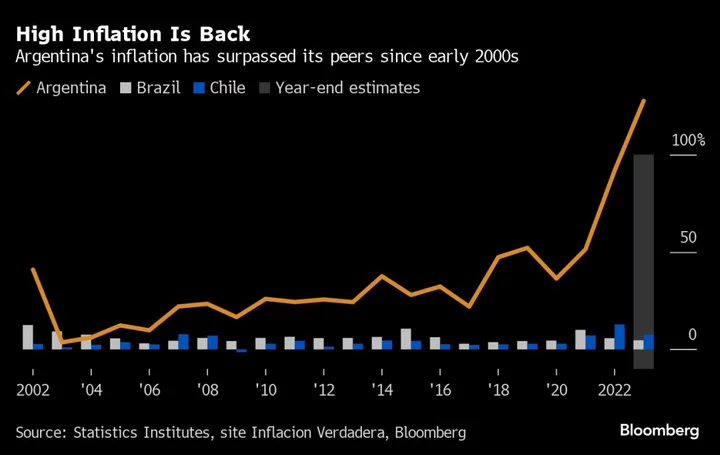Argentines are heading to the polls to pick between two presidential candidates with profoundly distinct plans to pull their country from the brink of economic catastrophe.
Sunday’s runoff election pits Economy Minister Sergio Massa, from the ruling Peronist party, against libertarian outsider Javier Milei, who displaced a traditional center-right coalition in the first round of voting last month.
The stakes couldn’t be higher: with consumer prices jumping 143% a year, a relentless currency depreciation and a recession looming, South America’s second-largest economy stands just a few policy mistakes away from hyperinflation and a full-blown social crisis.
Read More: Argentina’s Economy Is Abnormal and These Six Charts Show How
Voting booths close at 6 p.m. and official results are expected late Sunday night. The winner of the popular vote will take office Dec. 10, starting a four-year term.
Here’s what to watch:
Economic, Political Crossroads
The proposals put forth by the two finalists couldn’t be more different, from how to handle the economy to the ideal role and size of the state to how to carry out foreign policy.
Massa, who’s been in charge of the economy as inflation soared into triple digits, has pledged gradual changes to balance the budget next year while slowly unwinding the byzantine currency controls his own government has introduced. He favors a multilateral approach in relations with the US, China and South American neighbors.
Milei, on the other hand, has vowed to slash government spending, close the central bank and replace the peso with the US dollar as part of a strategy to rein in inflation. He has called the Chinese “assassins” and said he wouldn’t talk with “communist” governments in Latin America, including those of Brazil, Colombia and Chile — although he promised not to stop the private sector from dealing with those countries.
Much-needed austerity measures, regardless of their implementation speed, will be a bitter medicine in a country where 40% of the population lives below the poverty line, relying on government handouts and subsidies to survive.
Read More: Massa Versus Milei: Key Plans From Argentina’s Top Contenders
Currency Devaluation
While economists agree that an additional currency devaluation is unavoidable no matter who the next president is, analysts expect the peso to sell off if Milei wins, given his radical proposals.
The official exchange rate, despite strict currency controls, is already 50% down so far this year. In parallel markets, which reflect what people say the currency is worth, the peso has weakened from 500 per dollar in July to over 1,000 per dollar in October, before recouping some losses this month.
Read More: After $24 Billion Wipeout, Argentina’s Bonds Face Election Test
In a sign of growing anxiety, Argentines have withdrawn $2 billion from the banking system so far this year, or 13% of total dollar deposits.
Peronism’s Resilience
After years of political scandals and economic crises under Peronist governments, many expected the political force that dominated Argentina’s politics for the past 70 years to have its worst electoral performance ever.
In fact, Massa only received about 24% of the votes in the August primary, one of the worst results for a leading Peronist candidate since Argentina’s return to democracy in 1983. But the economy minister managed to turn around his campaign by boosting government spending, launching a fear campaign against Milei and bringing on some of the political advisers who helped elect Brazil’s President Luiz Inacio Lula da Silva last year.
The strategy worked and Massa led the first round of the October election with about 37% of votes, compared with Milei’s 30%.
Read More: Money Machine and Fear Were All It Took to Stop Milei’s Surge
Swing Voters
In the end, Argentina’s election will likely be decided by those who supported candidates who didn’t make it to the second round, particularly the nearly 24% of voters who cast a ballot for Patricia Bullrich last month.
While Bullrich signaled support for Milei, her pro-business group split after former President Mauricio Macri, the coalition’s founder, brokered a deal with the libertarian candidate without the agreement of other key party figures.
Many of those voters now find themselves in the unenviable position of having to choose between two polarizing candidates they dislike.
Read More: A None-of-the-Above Region Holds the Key to Argentina’s Election
--With assistance from Maria Eloisa Capurro.

